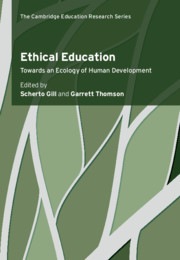Book contents
- Ethical Education
- Ethical Education
- Copyright page
- Contents
- Contributors
- General Introduction
- Part I Theoretical Perspectives on Ethical Education
- Introduction to Part I
- 1 Ethics in Education
- 2 Ethical Relationships in Schools
- 3 Towards an Ethical Understanding of Others
- Conclusion to Part I
- Part II Pedagogical Approaches to Ethical Education
- Part III Ethical Education in Practices
- Notes
- Bibliography
- Index
3 - Towards an Ethical Understanding of Others
from Part I - Theoretical Perspectives on Ethical Education
Published online by Cambridge University Press: 30 June 2020
- Ethical Education
- Ethical Education
- Copyright page
- Contents
- Contributors
- General Introduction
- Part I Theoretical Perspectives on Ethical Education
- Introduction to Part I
- 1 Ethics in Education
- 2 Ethical Relationships in Schools
- 3 Towards an Ethical Understanding of Others
- Conclusion to Part I
- Part II Pedagogical Approaches to Ethical Education
- Part III Ethical Education in Practices
- Notes
- Bibliography
- Index
Summary
What does it mean for a relationship to be ethical? Chapter 3 will provide two answers to this question and show how they are related. First, an ethical relationship requires that both parties appreciate and treat the other person as a being of equal non-instrumental value. Second, an ethical relationship requires that both parties are disposed to understand each other well in a specific way. This requires overcoming an epistemological asymmetry by reading the intentions of others according to the idea that they primarily will do some good. The two claims are related as follows: an important way of not respecting a person is to fail to understand her by succumbing to the epistemological asymmetry. It will examine this asymmetry in practice by showing how people typically misunderstand each other. Finally, this chapter will briefly explore the implications of these conclusions for relationship-based ethical education within the existing school system. These include creating spaces for sharing in which young people can feel safe, private and not judged, and where the educators can engender an appropriate atmosphere for listening and dialogue.
Keywords
- Type
- Chapter
- Information
- Ethical EducationTowards an Ecology of Human Development, pp. 43 - 58Publisher: Cambridge University PressPrint publication year: 2020



